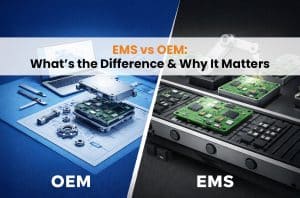Electronics these days are quick to move. What is today’s cutting-edge may be yesterday’s tomorrow. For companies designing products in India’s expanding Electronics Manufacturing Services (EMS) market, this speed creates one unmistakable question: how do you create products that will last?
The solution usually hides in two core practices—PCB design and Design for Manufacturability (DFM). Collectively, they do not only guarantee a blemish-free production cycle; they future-proof products against cost, quality, and scalability issues.
Why PCB Design Matters More Than Ever?
Printed Circuit Boards (PCBs) are the nervous system of all electronic devices. A PCB that has been well-designed is not merely placing components on a board neatly; it involves minimizing performance, thermal stability, reliability, and manufacturability.
In India’s EMS market, where demand cuts across consumer electronics, EVs, med devices, and industrial IoT, solid PCB design has emerged as a competitive enabler. Flawed boards can result in increased defect rates, costly redesigns, and wasted time in the scale-up production process. Conversely, sound design can cut costs, enhance product lifespan, and enable future versions with minimal adjustments.
If you’re looking for professional support, there are several reliable providers offering PCB Assembly in Chennai, PCB Assembly in Bangalore and other leading PCB Assembly Services across India.
- Cost savings: Reduced number of design changes and scrap rates.
- Accelerated time-to-market: Efficient transition from design to production..
- Quality control: Consistency in soldering, component location, and reliability.
- Scalability: Easy reproducing at higher volumes without bottlenecks.
Why It Matters in India’s EMS Environment
India is becoming a global EMS hub. Government-subsidized programs such as the Production-Linked Incentive (PLI) program and Make in India are attracting worldwide manufacturers to establish presence here. Opportunity, however, breeds pressure: makers have to ensure international quality, ship on time, and remain cost-competitive.
This is where PCB design and DFM come in as key enablers:
For innovators and startups: They minimize the risk of scaling up from prototype to large production.
For multinational companies relocating production to India: They provide consistency with world supply chains and compliance standards.
For local EMS providers and PCB Assembly Companies in India: They assist in establishing credibility by providing consistent, export-quality output.
Conclusion
Future-proofing doesn’t mean forecasting every trend. It means engineering flexibility and dependability into your product right from day one. Good PCB design and DFM best practices provide that advantage—allowing you to adapt with confidence as markets change, technologies advance, or volumes grow, without expensive rethinking.
FAQ
Why is PCB design important in electronics manufacturing?
PCB design is critical because it directly impacts product performance, thermal stability, reliability, and manufacturability. A well-designed PCB minimizes defects, reduces rework, and supports faster, more cost-effective scaling of production..
What is Design for Manufacturability (DFM) in PCB production?
Design for Manufacturability (DFM) is the process of designing electronic products with manufacturing efficiency in mind. It helps avoid costly design errors, reduces scrap rates, shortens time-to-market, and ensures smooth scalability from prototype to mass production.
How does PCB design affect product lifecycle and cost?
Strong PCB design enhances product lifespan by reducing thermal and electrical failures. It also lowers production costs by minimizing layout errors, component misplacement, and manufacturing delays during scaling or upgrades.
Why are PCB design and DFM important in India’s EMS industry?
In India’s fast-growing EMS sector, PCB design and DFM are crucial for meeting international quality standards, enabling fast production turnarounds, and supporting cost-effective scalability—especially as global brands shift manufacturing to India.
How do PCB design and DFM help future-proof electronic products?
PCB design and DFM future-proof products by ensuring they are robust, reliable, and adaptable to changes in technology or volume. They reduce the risk of redesigns, delays, and quality issues as product demand grows or evolves.


